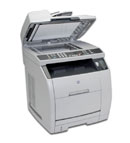
If anyone is in the market for a multifunction device with a colour laser printing, scanning and fax capabilities, Mike Clements has a good recommendation, the HP LaserJet 2840. This printer is not for the average home user, but if you run a small/medium sized office this printer delivers functionality and features at a very competitive price.
What follows is Mike's thoughts on the device...
I purchased the HP 2840 from Ingram Micro as they offer very competitive pricing within New Zealand. Installation could have been easier, the documentation is a bit average for anything past how to un-pack it and install the software, but once setup is complete it is a fantastic printer. One lesson, remember to leave the SNMP on its default settings (R/W).
This is the only "All in One" device I have ever liked, mainly because of its quality and deep featureset. Here is an overview of what it does:
- Prints photos
- Photocopies
- Scans (flat bed)
- Fax machine (inbound and outbound)
- Has a 50 page document feeder for scanning, copying and faxing
- Built in card reader (SD, CF, XD, MS etc.) that is exposed as a CIFS share on the network (iPhoto even sees it)
- Internal JetDirect for network connection & USB 2
- Supports network (IP) based faxing and scanning in colour
Here is a list of things that put it above many competing multi-function devices out there:
- It is very easy to use.
- Full control from either a network PC or at the printer (i.e. pick a machine to send your scanned image too).
- The LCD panel is actually helpful with steps and errors.
- All the cables you need are provided in the box.
- Standard consumables supplied with it are a imaging drum (8,000 pages), Black toner (5,000 pages), 3 x colour (4,000 pages each).
- Consumable use is well measured and reported via web admin page.
- Errors are tracked and logged (you can email them, send notifications via SNMP to PCs etc).
- Faxes can forward, stored on your PC or set to auto-print.
- Configuration is all web based via an easy to use administration interface. The settings can then be backed up to a file for easy restoration.
- Supports duplex printing via some manual intervention (but not too bad).
- Print standards support RAW (port 9100) and LPR printing. This makes it easy to setup via CUPS, NDPS, etc. SNMP is used to detect other devices on the network.
- "Straight through" printing is possible to avoid the bending of photos or transparencies.
- It has two paper trays; one for photo paper/envenlopes, letter head, etc. and another for your main paper, e.g. A4.
- Power saving appears to be excellent with no annoying fans.
- Full software and driver support for Windows & Mac (all features) and a reasonable amount of Linux support (but unsure if this is for all features or just printing).
- The software suite appears solid, intuitive and unintrusive. This is quite unlike many other HP printer software packages.
- TWAIN is supported so graphic applications on your PC or Mac that support TWAIN can scan images from the device direct to the application.
- Installation of the PCL and Postscript printer drivers are separate from the full software package, this makes setting up iPrint/NDPS much easier.
- Full support for Zeroconf (i.e. Bonjour). As a result it is automatically detected by Zeroconf/Bonjour enabled systems (e.g. OSX, Windows with Bonjour, etc.).
It is not all roses however, there are some downsides:
- The device is noisy when printing because it rotates toner cartridges. Whilst not painful, it is louder than your average laser printer.
- Tray 2 (main paper tray) only supports 275 pages. This is not to bad but it would be nice to support a full ream of paper (i.e. 500 pages).
- The device itself is quite large and will probably not win any beauty contests.
The HP 2840 even does funky things like if you put in a memory card and tell it to print a proof sheet (thumbnails of your photos), you can then mark on the proof sheet which photos to print at what size, and have these photos automatically printed by feeding the proof sheet back into the device.
Honestly this device has really impressed me. It is the printer equivalent to my iPhone/iMac fetish and would be the device I would expect if Apple decided to make one.
